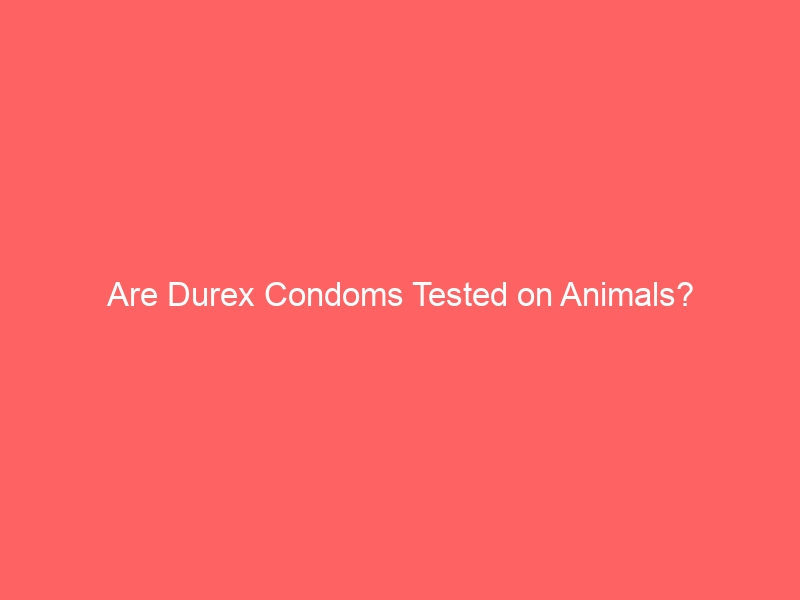When it comes to choosing products, you might wonder if they align with your values, especially regarding animal welfare. You may have heard questions like "are Durex condoms cruelty free?" swirling around in conversations. In this article, you’ll find out the truth behind Durex’s testing practices and their commitment to ethical standards. We’ll dive into the current regulations that govern condom safety and the science behind how they’re tested. By the end, you’ll have a clearer understanding of whether Durex condoms meet your expectations for cruelty-free products.
Key Takeaways
Durex does not conduct animal testing, reflecting a commitment to animal welfare and ethical manufacturing practices.
Growing consumer demand for cruelty-free products influences brand loyalty and purchasing decisions.
Condom safety is regulated by strict guidelines ensuring thorough testing for durability, effectiveness, and allergens.
Ethical practices in manufacturing are reshaping the market, prompting brands to adopt non-animal testing methods.
Understanding Animal Testing in the Cosmetics Industry
You’re likely aware that animal testing in the cosmetics industry raises significant ethical concerns. Many consumers question the necessity of such practices when alternatives exist. You might find it troubling that animals often endure pain and suffering for products that are not essential. The push for cruelty-free cosmetics has gained momentum, reflecting a shift in consumer values. As a result, some brands have begun to seek out and promote non-animal testing methods.
Durex’s Commitment to Ethical Practices
Durex is committed to ethical practices, ensuring that their products are not tested on animals. You’re supporting a brand that values animal welfare and promotes responsible manufacturing. By choosing Durex, you can trust that your purchase aligns with your ethical beliefs. The company actively seeks alternatives to animal testing in their product development. Together, you’re contributing to a more compassionate approach to consumer goods.
Current Regulations on Condom Safety
Current regulations on condom safety require thorough testing to ensure they meet health standards before reaching consumers. Manufacturers must comply with strict guidelines set by health authorities. Testing often includes assessments for durability, effectiveness, and potential allergens. You’ll find that these regulations are designed to prioritize user safety and product reliability. Ultimately, the aim is to provide you with high-quality protection.
The Science Behind Condom Testing
The science behind condom testing involves rigorous assessments to ensure safety and efficacy. You might find it interesting that these tests evaluate various factors, including durability and reliability. Manufacturers use specific protocols to simulate real-life conditions. They also conduct performance tests to confirm that condoms can withstand pressure and friction. Ultimately, these assessments aim to protect your health and enhance your experience.
Consumer Concerns About Animal Welfare
Consumer concerns about animal welfare can significantly influence your purchasing decisions. You might prioritize brands that align with your values regarding ethical treatment of animals. If you discover that a product is tested on animals, it could deter you from making that purchase. Many consumers are willing to pay a premium for cruelty-free options. Ultimately, your choices reflect your commitment to animal welfare.
Alternatives to Animal Testing in the Industry
Many companies are exploring innovative methods like computer modeling and in vitro testing to replace animal testing in the industry. You might find that these alternatives provide more accurate results without the ethical concerns associated with animal use. Additionally, these methods can often be more cost-effective in the long run. As technology advances, you’ll see more companies adopting these practices. This shift could lead to a significant reduction in the reliance on animal testing across various sectors.
Durex’s Transparency and Communication
You’re likely interested in how transparent the brand is about its testing practices. Durex prides itself on clear communication regarding its commitment to ethical standards. They openly share information about their testing methods on their website. You’ll find that they focus on quality and safety without resorting to animal testing. This transparency helps build trust with consumers who care about ethical considerations.
Public Perception of Animal Testing in Products
Public opinion often influences how consumers feel about products tested on animals. You might feel uneasy knowing that some products undergo animal testing, even if they’re deemed safe for human use. Your perception can shift based on the information you read or hear from friends and media. If you prioritize cruelty-free options, you may choose to avoid brands associated with animal testing. Ultimately, your choices reflect your values regarding animal welfare and product safety.
Making Informed Choices as a Consumer
Understanding the ethical standards behind products like Durex condoms helps you make informed choices. You should consider the implications of animal testing on your purchasing decisions. It’s important to research the brands you support and their testing practices. You’re empowered to choose products that align with your values. By staying informed, you can contribute to a more ethical marketplace.
If you’re looking for the best condom options tailored for your needs, I highly recommend checking out the article on top brands for the best condoms for Winman. It offers valuable insights and recommendations to help you make an informed choice. You can view it here.
